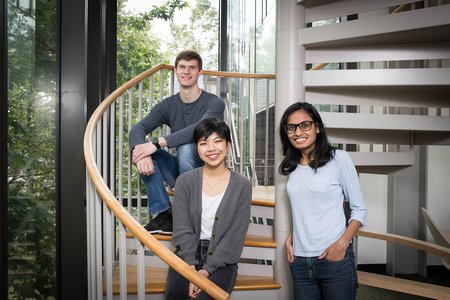Among people who are homeless, lack of connection to family and friends poses an often-overlooked obstacle to stability and well-being.
"Homeless people haven't just lost a roof over their heads, they've often lost their ties to loved ones," says Nivetha Karthikeyan, a Caltech senior studying computer science and history. Over the course of the past academic year, Karthikeyan worked alongside sophomore Myra Cheng and junior Andrew Hess to help address the problem by developing new technological tools for Miracle Messages, a nonprofit that helps reunite homeless people with friends and relatives.
Founded in San Francisco, Miracle Messages helps homeless individuals record video or audio messages to loved ones they have lost all contact with. Then, using as much information as the individual is able to provide, volunteers scour social media and other digital platforms to find those loved ones and deliver the message. Over the past five years, Miracle Messages has facilitated reunions for more than 200 clients who had been disconnected from their families for around 20 years, on average.
Now, the organization's efforts will be enhanced and supported by a database and web application developed by Karthikeyan, Cheng, and Hess, all students in Caltech's Division of Engineering and Applied Science.
The project grew out of a shared interest in the intersection of technology and activism, and the potential for computer science to serve as a vehicle for advancing social good.
"It's something I really want to explore: how tech interacts with society and how we can use what we learn in the classroom to solve real societal problems," Kartikeyan says.
About a year ago, she and Cheng sent out an email to survey student interest in TechReach, a new club that would focus on using computer science to serve nonprofit and community needs. They received more than 60 interested responses.
On the advice of Claire Ralph, lecturer and director of outreach and partnerships for Caltech's computing and mathematical sciences department, Karthikeyan and Cheng elected to launch TechReach with a pilot project led by a team of three.
For Cheng, the club represents an opportunity to build on similar work she had done with the volunteer organization Code for San Jose. "There are issues I care about independently of computer science," she says. "It's exciting to use tech skills, to write code, in a way that is impacting people."
Hess, too, was drawn to the possibility of applying computer science to a concrete social problem: "I wanted to get real-world experience and to actually help people in a significant way."
Ralph connected the trio to Ovio, an organization that matches skilled volunteers with nonprofits that need help with software and technology. In turn, Ovio connected them with Miracle Messages, which needed to improve the systems its volunteers use to collect, store, and manage data from homeless clients.
"The students spent a lot of time thinking about it and saw that this was a problem technology could solve," Ralph says.
She also linked the students to Mike Walsh (BS '81), the recently retired co-founder of Quotient Technology, Inc., formerly known as Coupons.com. With extensive experience in the developer community, Walsh served as a project mentor, offering insights on how to work with clients in approaching complex tech problems.
"Clients in general are not as tech savvy as you, the developer," Walsh says. "Part of your job is helping them tell you what they need. Learning how to do that could almost be its own course."
Beyond the chance to apply their skills in a professional setting, programs like TechReach offer students perspective on their identities as developers and the careers they hope to build.
"Working on a project like this can be what reveals your calling," Walsh says.
As their work with Miracle Messages winds down, the students hope to expand TechReach to five or six new projects involving larger numbers of computer science volunteers and a broader range of issues. They'd also like to develop connections with nonprofits serving local communities.
"Understanding the needs of the client is just as important as understanding the technology," Karthikeyan says. "We want to know more about the issues facing Pasadena to really figure out how our skills might help."
Written by Jennifer Torres-Siders




